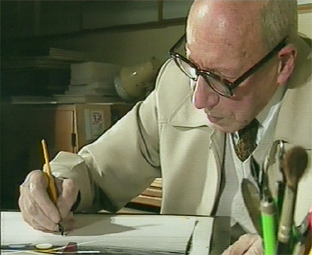A Quote by Mahatma Gandhi
A person who is worried about the outcome of his work does not see his goal; he sees only his opposition and the obstacles before him.
Related Quotes
The citizen who thinks he sees that the commonwealth's political clothes are worn out, and yet holds his peace and does not agitate for a new suit, is disloyal, he is a traitor. That he may be the only one who thinks he sees this decay, does not excuse him: it is his duty to agitate anyway, and it is the duty of others to vote him down if they do not see the matter as he does.
The master in the art of living makes little distinction between his work and his play, his labor and his leisure, his mind and his body, his information and his recreation, his love and his religion. He hardly knows which is which. He simply pursues his vision of excellence at whatever he does, leaving others to decide whether he is working or playing. To him he's always doing both.
But who does not see that the work goes beyond the one who created it? It marches before him and he will never again be able to catch up with it, it soon leaves his orbit, it will soon belong to another, since he, more quickly than his work, changes and becomes deformed, since before his work dies, he dies.
The artist should paint not only what he sees before him, but also what he sees within him. If, however, he sees nothing within him, then he should also refrain from painting that which he sees before him. Otherwise, his pictures will be like those folding screens behind which one expects to find only the sick or the dead.
It is only in his work that an artist can find reality and satisfaction, for the actual world is less intense than the world of his invention and consequently his life, without recourse to violent disorder, does not seem very substantial. The right condition for him is that in which his work in not only convenient but unavoidable.
The fact that labour is external to the worker, i.e., it does not belong to his intrinsic nature; that in his work, therefore he does not affirm himself but denies himself, does not feel content but unhappy, does not develop freely his physical and mental energy but mortifies his body and his mind. The worker therefore only feels himself outside his work, and in his work feels outside himself.
The Landlord is a gentleman who does not earn his wealth. He has a host of agents and clerks that receive for him. He does not even take the trouble to spend his wealth. He has a host of people around him to do the actual spending. He never sees it until he comes to enjoy it. His sole function, his chief pride, is the stately consumption of wealth produced by others.
I like a person who knows his own mind and sticks to it; who sees at once what is to be done in given circumstances and does it. He does not beat about the bush for difficulties or excuses, but goes the shortest and most effectual way to work to attain his own ends, or to accomplish a useful object.
All things are God's already; we can give him no right, by consecrating any, that he had not before, only we set it apart to his service - just as a gardener brings his master a basket of apricots, and presents them; his lord thanks him, and perhaps gives him something for his pains, and yet the apricots were as much his lord's before as now.
When the Spirit of God comes into us, He wants to be Himself in us. He wants His energy to be poured through us. He wants His wisdom to be deposited in our hearts. He wants His instinct and nature to be evident and obvious in you.He wants us to see what He is looking at, to feel what He feels, to know what He knows, to work with His projects, see life the way He sees it, get His ideas and know His opinion about yourself and others.










































